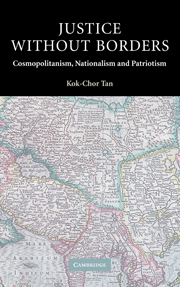10 - Conclusion
Published online by Cambridge University Press: 22 September 2009
Summary
Contemporary accounts of cosmopolitan justice have been criticized for failing to take seriously the ties and commitments of nationalism and patriotism. The criticism can be put in the form of a dilemma: either we reject the cosmopolitan idea of global equality or we deny that nationalist and patriotic commitments are admissible. In this book, I have tried to show that cosmopolitan justice, properly understood, can accommodate, in a nontrivial way, liberal forms of nationalism and patriotic commitments. Cosmopolitan justice does not require a world in which national boundaries and patriotic commitments have to recede and wither away. The basic features of nationalism most often thought to be antithetical to cosmopolitan justice – the principle of self-determination, and the ideas of national partiality and national solidarity – are compatible with cosmopolitan principles if these nationalist demands are kept within the parameters of liberal nationalism. And the patriotic idea, that compatriots show special concern to each other, does not pose a real threat to the cosmopolitan idea of justice. On the contrary, I have argued that our ordinary understanding of the relationship between justice and personal pursuits would require that patriotic commitments be limited against the demands of cosmopolitan justice. Limiting patriotism against cosmopolitan justice does not imply a reductionist account of patriotism. It can still be accepted that patriotism has more than merely instrumental value, and that it can acquire its moral significance independently of cosmopolitan principles or commitments.
- Type
- Chapter
- Information
- Justice without BordersCosmopolitanism, Nationalism, and Patriotism, pp. 198 - 202Publisher: Cambridge University PressPrint publication year: 2004
- 2
- Cited by

